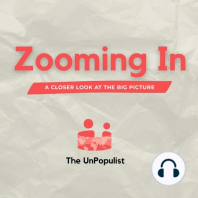8 min listen

How Not to Reform the "Deep State": The UnPopulist Editor's Roundtable
How Not to Reform the "Deep State": The UnPopulist Editor's Roundtable
ratings:
Length:
32 minutes
Released:
Dec 3, 2023
Format:
Podcast episode
Description
Aaron Ross Powell: Welcome to Zooming In, a project of The UnPopulist. I'm Aaron Ross Powell. I'm joined today by my colleagues, Shikha Dalmia and Akiva Malamet for our editors' round table. Recent reporting has uncovered plans by Trump allies, and Trumpist think tanks, and other organizations to deconstruct the administrative state.A transcript of today’s podcast appears below. It has been edited for flow and clarity.Aaron Ross Powell: I think all of us agree that the administrative state is unaccountable and too large, so what's wrong with Trump's plans to reform it?Shikha Dalmia: Good morning, Aaron and Akiva. We haven't done this in a while, right? We are getting together in this format after a long time, but I'm surprised, Aaron, you didn't use the word “deep state,” because that's the term of art these days, right? What's wrong with the “deep state?” There are actually plenty of things wrong with the deep state, but we actually in the US don't really have a deep state.Deep state is an idea that was originally meant to describe the kind of bureaucracy we had in countries like Turkey and Egypt, which was controlled by the military and security forces. They engaged in all kinds of machinations behind the scenes to control civilian authorities and the populace at large. Their functioning was completely opaque and the subject of all kinds of conspiracy theories in the Middle East.That's not what we have here in the United States. What we have in the United States is a problematic situation, where those of us who believe in government of limited size and scope, the federal government is very large. It performs functions far beyond what, I think it's fair to say, the Founders originally visualized and the bureaucratic state, the administrative state, has grown apace.Now, if you talk to my friend Frank Fukuyama, he will tell you that actually, the bureaucracy is not large enough because the federal government's functions have grown far, far more than the bureaucracy has, and the bureaucracy simply can't keep up with providing the kinds of professional and efficient execution that it was meant to do. Now, regardless of what you think about that view, I think from our point of view, an administrative state that in its current form is quite problematic, but it is part of a bigger problem with the federal government.As the federal government was originally envisualized in this country, each branch had very specific role, and had very specific powers and functions. Each side was supposed to guard that, guard their functions in a very, very jealous way. The idea was that would allow the public at large to keep each government branch publicly accountable, and at the same time, each branch would provide a check on the other.Now, that actually has not how things have worked out in the United States. Over a period of time, Congress has delegated too much of its authority to both the president and the executive agencies under the president. If you think of the War Powers Act, it was supposed to curtail the president's war-making ability. But Congress has got used to giving very large authorization of power to wage all kinds of wars in all kinds of countries post 9/11. That was one huge usurpation of power by the executive, not intentionally, but in effect from Congress.Congress also writes very broad and vague legislations and then lets the administrative branch define them in any way it wants to. That essentially means, this is the critique of the administrative state, is that therefore the administrative branches have very sweeping legislative powers through their powers of interpretation that nobody can really control. Congress can't control the executive agencies and the president can't control the executive agencies either, because many of these people are civil servants and bureaucrats and they are protected by rules of a professional bureaucracy. So they become largely unaccountable.If you are listening to our conservative friends,
Released:
Dec 3, 2023
Format:
Podcast episode
Titles in the series (32)
Trailer - Reactionary Minds Podcast by Zooming In at The UnPopulist